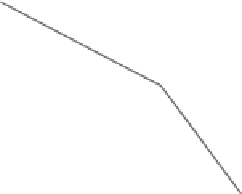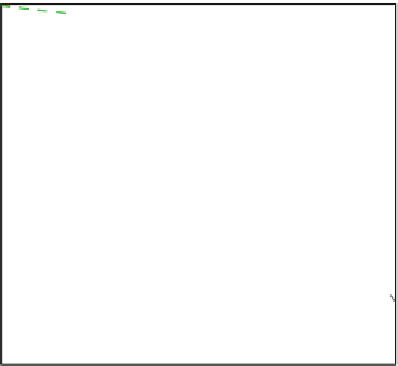Environmental Engineering Reference
In-Depth Information
time of 60 min for both mesquite and juniper samples. The model results compare
well with the experimental results except at the upper temperature limit. At tem-
perature of 300
C, TCM overpredicts the mass loss from the woody biomass. The
kinetic constants of cellulose used to model the torrefaction process resulted in
increased losses of cellulose at higher temperatures in the TCM. The variation in
mass loss with increase in residence time for an initial heating rate of 20
°
C/min is
plotted in Fig.
8
. Following residence times were studied: 30, 45, 60, and 120 min.
Effect of higher residence time on mass loss was negligible at lower torrefaction
temperatures, while an increase in temperature resulted in increased mass loss due
to higher time and energy available for the volatilization of cellulose and lignin
present in the biomass. Higher percentages of cellulose are released from the
sample resulting in higher mass loss.
As the heating rate increased, the results showed an increased retention of mass
at higher torrefaction temperatures when compared to the lower heating rates.
Higher heating rates do not allow suf
°
cient time for the volatiles to escape out from
the biomass which causes lower mass loss during the initial heat up period. Hence,
higher heating rates can be employed to reduce the loss of combustible volatile
matter from the biomass at higher temperatures.
Energy Conversion Ratio (ECR) and Heating Value of the Torrefied Sample
The heating value and the chemical composition of the three components were used
to monitor the change in heating value of the torre
ed biomass with reference to the
raw samples. Energy conversion ratio (ECR) which is de
ned as the ratio of the
energy content of the torre
ed sample to the energy content of the raw biomass and
the ratio of the heating value of the torre
ed biomass to raw biomass was also
Fig. 8 Variation in mass loss
with increase in torrefaction
temperature and residence
times. M Mesquite; J Juniper
90
80
70
60
M-30 min
M-45 min
M-60 min
M-120 min
J-30 min
J-45 min
J-60 min
J-120 min
50
40
30
200
220
240
260
280
300
Temperature (
o
C)







































































































































































































































Search WWH ::

Custom Search